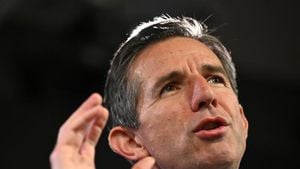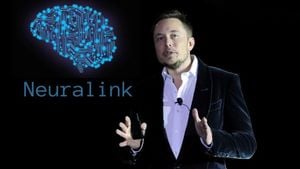Australia has found itself at the center of the nuclear energy debate amid rising concerns about climate change. At the heart of this discussion is Dr. Adi Paterson, chair of Nuclear for Australia, who recently made headlines with some controversial statements.
Paterson dismissed concerns about carbon dioxide emissions, labeling them as an "irrational fear of a trace gas which is plant food.” His comments have sparked significant backlash from climate activists and experts who take issue with his denial of the link between greenhouse gases and global warming.
Despite his role advocating for nuclear energy, Paterson's views sit uncomfortably with the mission of Nuclear for Australia, which emphasizes the urgency of nuclear power to combat climate change. His recent comments, especially the assertion about CO2 being beneficial for plant life, contradict the scientific consensus linking greenhouse gases to climate extremes.
During discussions on social media and various public forums, Paterson has emphasized his viewpoint as one of being a "climate realist" rather than outright denying climate change. He claims to have grounded his assertions on scientific analysis, describing himself as knowledgeable about climate science.
Experts, including Prof. David Karoly and Dr. John Cook, have strongly criticized Paterson’s stance. They argue his views promote misconceptions and undermine efforts to address climate change adequately.
Many scientists assert CO2 levels are at their highest since the emergence of modern humans. This increase correlates with severe weather events, droughts, and floods, making the urgency for addressing greenhouse gas emissions clear.
Conversely, supporters of nuclear energy, like Paterson, argue it presents a stable solution to reduce reliance on fossil fuels and combat climate effects. Yet, concerns about the safety and environmental impact of nuclear power persist, complicading the dialogue around potential energy solutions.
The dichotomy within Australia’s energy debate showcases broader global struggles over energy policy, environmental responsibility, and public safety. The tension between those advocating for immediate action against climate change and pro-nuclear advocates like Paterson continues to generate heated discussions.
Paterson, having previously served as chief executive of the Australian Nuclear Science and Technology Organisation, continues to attract attention for his provocative statements. For example, he has previously suggested on social media platforms, including Linkedln, to re-evaluate the credibility of organizations like NASA for publishing climate data.
On multiple occasions, Paterson has warned against the environmental impacts of renewable energy infrastructures. He raised concerns about the so-called ‘ecocide’ stemming from the construction of wind and solar farms, shifting the focus from fossil fuel alternatives to nuclear energy debates.
This narrative has culminated recently, where his comments have been characterized as standard rhetoric from climate science deniers, feeding confusion within the public discourse on climate issues. His framing implies there is no urgent need to pivot away from fossil fuels, as he views increases in CO2 as potentially harmless, even beneficial.
Paterson’s criticisms of climate science rest on disputing the established link between greenhouse gas emissions and significant weather changes. He previously claimed it’s inaccurate to correlate current extreme weather events directly to climate change, which contrasts starkly with findings from the UN’s climate panel.
The scientific community refutes his assertions, stating unequivocally the correlation between human-induced greenhouse gases and the increased frequency of extreme weather events is well-supported by research. Climate scientists stress the need for proactive efforts to mitigate the very real risks associated with rising global temperatures.
Throughout these exchanges, interest groups advocating for nuclear energy remain steadfast. They argue nuclear power can play a key role in Australia’s energy future, providing necessary power supplies without the carbon footprint associated with traditional fossil fuels.
Though the Australian government has yet to fully embrace nuclear energy, the potential expansion of this sector remains part of the wider discourse around renewable energy solutions. Whatever stance individuals take, the conversation about nuclear energy's role continues to evolve amid the pressing realities of climate change.
Paterson’s complex position highlights the nuances of the nuclear debate. Though advocating for nuclear as part of the solution, his remarks call to question the commitments to environmental goals clashing with his rhetoric downplaying climate risks.
This dynamic reveals how multifaceted and contentious the nuclear energy debate is within Australia. Opponents and proponents alike are presenting narratives aimed at swaying public opinion.
The conversation surrounding nuclear energy will undoubtedly continue as proponents like Paterson strive to legitimize their positions amid opposing views centered on climate responsibility. The path forward involves balancing these perspectives against the pressing backdrop of climate change.
While calling for nuclear expansion, the challenge remains for advocates to adequately address the fears and concerns voiced by environmentalists. This acknowledgment is key to moving forward constructively.
Dr. Adi Paterson's recent comments reiterate the need for mutual respect and comprehension among various stakeholders engaged in this important dialogue about energy, climate, and public safety. The results of this debate may have lasting ramifications for Australia’s energy policies and environmental impact.



